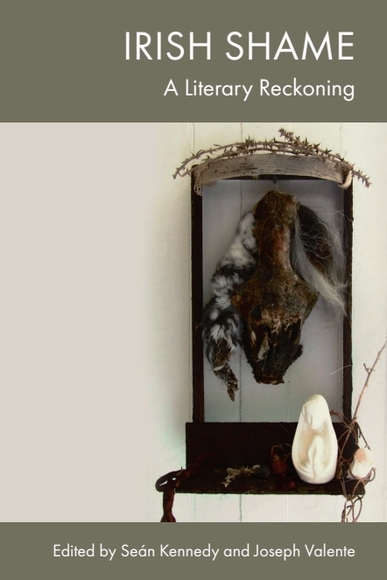
by Séan Kennedy and Joseph Valente

Irish Shame: A Literary Reckoning is the first edited collection dedicated to the historical specifics of Irish shame.
Elon Musk has declared empathy the “great weakness of western civilization”. More than empathy deficient, he professes himself empathy averse. The sociopathy of this position undergirds the DOGE cuts as well as the ruthless immigration policies of the Trump administration. Civilization, it seems, is nothing without its scapegoats.
Our edited volume, Irish Shame, grows out of Ireland’s history of civilization and/as scapegoating. And it contains object lessons for anyone who thinks pitilessness offers a productive path to prosperity.
In Ireland, aggressive civilization was most pitilessly applied to the most vulnerable of its populace: ‘fallen women’, ‘unmarried mothers’, ‘persons of unsound mind’. These were contrived categories for a culture of redemption through humiliation: incarceration, forced labor, penitence.
Irish Shame documents the pitilessness of Ireland’s containment culture as it appears in Irish writing. We also wanted to think, theoretically, about the divisive subject of Irish shame itself: as a dialectical, hence reciprocal, experience, with strangely curative as well as toxic potentialities–what Plato called a pharmakon.
Shame constitutes a violently involuntary species of self-othering. This gloss becomes especially legible in the distinction of shame from guilt, its first cousin once removed. The sense of guilt goes to one’s actions for which one feels entirely responsible, insofar as those actions may be regarded as partible from the self, effects that need not have been produced. Shame, by contrast, cuts to the core of one’s self-conception, the structure of one’s assumed identity, but does so on an exogenous basis, i.e. from the perspective or gaze of the Other decisively internalized.
We use the term decisively here with purpose. It derives from the medieval Latin decidere, which means to cut off. And the onset of shame does indeed serve to cut off the self from the pull of the interpersonal, shrinking and sealing one within the wounded precincts of the ego. Shame, as everyone knows, triggers a desire to hide. But it also balks that desire in advance and by definition. For the experience of shame not only entails but somaticizes the occupation of those precincts, the hiding place itself, by the gaze of the other. Shame stages an enforced intimacy of self and other, in which the latter stands in judgment of the former with the subject’s own voice. The shamed subject is thus expelled, at least temporarily, from the redoubt of their own self-regard. As we said, a violently involuntary self-othering.
What the sufferer manifests bodily and behaviorally as shame is this devastating impacted dialectic of inner and outer, ego and its counter/part, which is why shame proves as infectious as it is isolating. The internalization of the mocking gaze of the Other exerts a gravitational pull on those who observe the shame reaction. To witness shame is to be conscripted to the role of the shaming gaze. There is an enforced intimacy with its object. This self-othering impetus of shame has as its correlative the incitement to identification with the victim: a selfing of the Other, if you will. It is central to the phenomenology of shame that it is transmissible from one circumstance and subject to another. We are all prone to feel some form of shame in the vicinity of a shaming spectacle.
An extraordinary implication follows from this affective contagion. In its communicability, our capacity for shame mirrors our capacity for empathy. In empathy, we project ourselves into another to radiate solidarity. In shame, we introject the other as our own (self-)othering arbiter. Shame is the photographic negative of empathy: darkness to its light.
This is the lesson of Musk’s call to ruthlessness. The kindred logic binding shame and empathy is most glaringly revealed in their absence. The imperviousness to the feelings of others manifests as a disregard for the censorious judgments of the other within. Without empathy there is no shame and vice-versa. When Musk gleefully puts USAID “in the woodchipper,” letting thousands of impoverished children die of starvation and disease; when Ireland admits only to humiliate, asylum seekers, they do so, and can only do so because they are immune to the opprobrium they incur.
“Our potential for humiliation is the root of morality,” Adam Phillips has argued. And that, we would add, is because our liability to shame reveals an irreducible concern with the dignity of others. It is what Jean Paul Sartre meant by ‘pitiless reciprocity’. Lacking such concern, Musk feels no shame of recognition at being the most disliked person in America.
The point might be that empathy and shame matter twice: they dignify our relation to the Other, but they also found the possibility of a dignified relationship to Our selves. The contributors to Irish Shame demonstrate this in fine, often dispiriting detail.
About the editors
Seán Kennedy is an Irish scholar, writer and scavenger artist living and working in the unceded territory of Kjipuktuk. His most recent publication, a close reading of the film Joker (2019), is called Send in the Clowns! Popular Politics After Neoliberalism, and was co-authored with James McNaughton.
Joseph Valente is the author of several books, most notably The Myth of Manliness in Irish National Culture, 1880-1922. He is also the editor of several volumes, including Quare Joyce. His recent work has been in the area of disability and neurodivergence.





